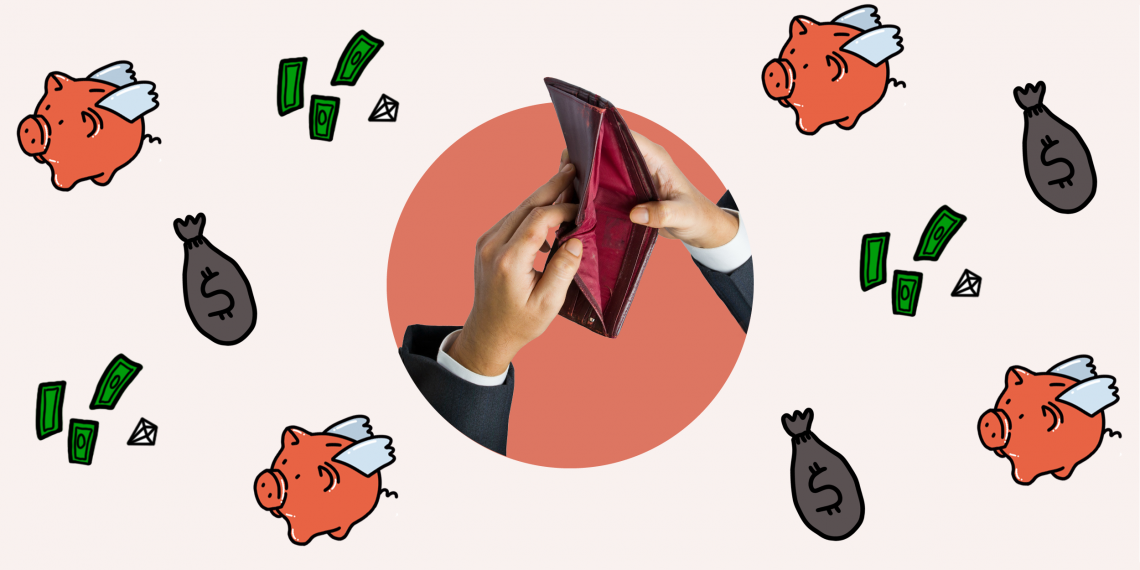Some things seem completely innocent until you start calculating the consequences.
You do not have enough money to pay
Let’s start with the obvious. Even if you occasionally remain penniless for a few days, this is a reason to think if everything is in order with your financial discipline. And you definitely need to change something if it happens regularly.
It is possible to do without money for several days, but at the same time, you are at great risk. Suddenly there will be health problems or other force majeure. Therefore, something urgently needs to be done.
What to do
The advice “to earn more” suggests itself. This will not be superfluous, but it is unlikely to solve the problem because you are spending money irrationally. Most likely, you will continue to do so when earnings grow.
Read also: How to Choose Dividend Stocks.
With any income, especially with a low one, you need to plan your expenses. You may not want to make a budget accurate to the penny, but at least you have to calculate it approximately. Otherwise, at one unpleasant moment, you may start to get into trouble.
You have no savings
You have enough for everything, and it seems that there is nothing to worry about. In fact, there are reasons for alarm. Money can keep you safe in many ways, such as if you get sick and need expensive treatment or if you have to quit. Savings will help you ride out a bad period.
If you are an optimist, consider that not saving is taking your chances. For example, you cannot profitably buy vacation tickets, because right now you have no money, and your salary is still far away.
What to do
Save money from every paycheck, say 10%. You should have accumulated an amount equal to income in two months, and ideally in six months. This will help to cope with force majeure in case of their occurrence.
You have multiple credits.s
But you are using things bought with bank money right now. Is that how you reasoned when you took out these loans? As a result, paying off the principal and interest costs an impressive amount, which you could, for example, save to buy the same thing, but without overpaying.
When it comes to vital matters, of course, the loan is justified. But make all of the purchases you borrowed for fall into this category? If not, you are not serious about money and too indulge in momentary desires, ending up sad.
What to do
Start solving the problem by the consistently early repayment of loans. But first, analyze your debt burden to understand which loan to pay off first.
For example, you now have three loans. And you can also allocate 5 thousand per month to use them to repay the loan with a reduction in its term.
| Credit | Balance, rubles | Interest rate, % | Term, years | Monthly payment, rubles |
| Mortgage | 900,000 | ten | five | 19120 |
| To phone | 70,000 | fifteen | 2 | 3 390 |
| On the refrigerator | 24,000 | fifteen | 1 | 2 160 |
If you make an additional 5 thousand on a mortgage during the year, then you will save 25.4 thousand on early payments and reduce its term by 4 months. With a similar scheme, you will pay off a phone loan in 9 months and save 6.5 thousand, for a refrigerator – in 4 months and save 1.1 thousand.
Consider all options for early repayment, the best way is not always obvious.
At first glance, it is more profitable to pay off the mortgage ahead of schedule since the savings are higher. In this case, you will get rid of the refrigerator loan in a year, and you will have only two loans.
But you can start with the smallest loan for the refrigerator. Then it turns out that in 4 months, you will close it and be able to repay the loan on the phone ahead of schedule in the amount of 7.16 thousand (ahead of schedule plus the obligatory payment for the refrigerator). And this is just enough to pay off the second loan by the end of the year.
As a result, you will free up 5.55 thousand rubles (3.39 for a phone and 2.16 for a refrigerator), which you can pay for a mortgage in a year without additional efforts and save much more.

More than 50% of your income goes towards paying off loans.
When you have a salary of 2 million a month, you can live happily ever after and half of it. But let’s turn to more realistic cases. With a salary of 30 thousand, giving 50% to banks is already critical.
Also read: 8 Financial Lessons Learned from Coronavirus Pandemic.
In addition to the fact that this is just a heavy burden, one day, a situation may arise that you urgently need money for something vital, and you will not be able to pay off the loan. Penalties and fines will only exacerbate the situation, making it virtually hopeless.
What to do
You need to reduce your debt burden, but you can’t do it easily. First of all, you need to increase your income. For example, you can take a part-time job for the period needed to get rid of at least one loan early.
Or you will have to save money to pay off the loan ahead of schedule.
You have utility bills in arrears.
Firstly, you may be deprived of some of the resources, charge penalties, and, in some cases, even evict. Secondly, debts for housing and communal services betray your frivolous attitude to money. Mandatory payments are called so for a reason; they must be transferred on time. Lack of financial discipline prevents you from saving, saving, and earning more.
By the way, debts on housing and communal services negatively affect credit history.
What to do
Develop a good habit of adhering to a payment schedule. To get started, create reminders on your phone or Google Calendar.
You constantly quarrel with your partner over finances.
You have problems not with money, but because of money, but that also counts. Constant conflicts in the family have not yet made anyone richer, healthier, and happier.
What to do
Move from mutual recrimination to constructive discussion. You need to hear each other and understand if your partner’s problems tell you are real and come to some compromise. If you can’t do this, know that you have problems not only with finances.
Adapted and translated by Wiki Avenue Staff
Sources: Lifehacker






